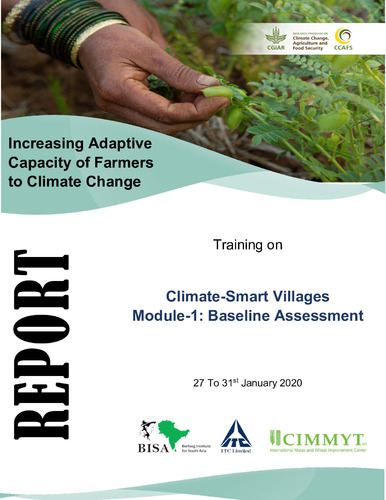Training Report: Increasing Adaptive Capacity of Farmers to Climate Change
Abstract
Climate-smart agriculture (CSA) aims to increase sustainable agricultural production by adapting and building resilience to climate change. It focuses on food security and national development goals and, where possible, it also aims to reduce or remove GHG emissions. The Climate-Smart Villages employ participatory methods, technological and institutional options for dealing with climate change in agriculture. In 2016, ITC Limited in collaboration with the CGIAR research program on climate change, agriculture and food security (CCAFS) envisioned developing a resilient agricultural production system in the ITC’s outreach areas across India. To realize this vision CGIAR’s Climate- Smart Village (CSV) approach was integrated into the ITC’s Mission Sunehra Kal (MSK) program. Since then, this CSV-MSK integration program has been focusing on building a resilient agricultural production system through the promotion of a range of climate-smart agricultural technologies and practices including e-Choupal, wasteland development, soil and moisture conservation, livestock development, health and education, and gender and social inclusion program of MSK. As part of the program, a series of training sessions have been planned for the ITC staff. The series of training would focus on capacitating the ITC team to independently implement and carry forward all the four stages of CSV approach i.e; Baseline assessment, Climate-Smart Village (CSV) designing, Monitoring and Evidence Generation and Scaling out CSVs. Present report documents the training process followed and the feedback received from the participants.

